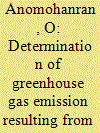| Srl | Item |
| 1 |
ID:
113478


|
|
|
|
|
| Publication |
2012.
|
| Summary/Abstract |
Greenhouse gas emission and its effect on the environment have gained the attention of researchers, environmentalists and policy makers in recent times. This is as a result of its devastating impact both on the climate and the environment. Records of natural gas produced and natural gas flared in Nigeria from 1999 to 2009 were collected and subjected to descriptive analysis as well as the Reference Approach method of greenhouse gas determination. Result showed that the total gas produced in Nigeria from 1999 to 2009 was 502 million cubic meters while 237 million cubic meters, representing 47% was flared. Result also showed that the total gas flared reduced from 23 million cubic meters in 1999 to 14 million cubic meters in 2009. Result indicates that the total quantity of carbon dioxide emitted between 1999 and 2009 was found to be 457 million metric tons which is 23.1 percent when compared with the global value of 1979 million metric tons. Result further indicates that an estimated sum of 11 billion dollars is lost annually to gas flaring in Nigeria. It is recommended that the government should put in place appropriate and implementable policies to end gas flaring in Nigeria.
|
|
|
|
|
|
|
|
|
|
|
|
|
|
|
|
| 2 |
ID:
178839


|
|
|
|
|
| Summary/Abstract |
This study aligns with Sustainable Development Goal 7 which aims at “ensuring access to affordable, clean energy, reliable, sustainable and modern energy for all”. The Gazetted Flare Gas Regulations 2018 provides a legal framework to support the policy objectives of the Federal Government for the reduction of Green House Gas emissions through the flaring and venting of natural gas. The Regulations provide the legal basis for the implementation of the Nigerian Gas Flare Commercialization Programme. This study investigates the factors contributing to gas flaring activities in Nigeria from 1970 to 2019. Using the autoregressive distributed lag error correction representation and cointegration techniques, findings reveal, among others, that in the long-run: (1) gas flaring activities is persistent; (2) economic growth induces flaring activities; (3) gas prices exert asymmetric impact; (4) gas utilization and fossil fuel are negative predictors. The result shows that gas price contemporaneously exerts positive and statistically significant impact at the 1% level. Gas price contributes 0.187 percent increase to gas flaring while its first lag induces significant reduction in gas flaring by 0.293 percent at 1 percent level of significance. This study also provides sufficient evidence on the persistency of gas flaring activities in Nigeria.
|
|
|
|
|
|
|
|
|
|
|
|
|
|
|
|
| 3 |
ID:
116735


|
|
|
|
|
| Publication |
2012.
|
| Summary/Abstract |
Reducing Russia,s high levels of Associated Petroleum Gas (APG) flaring has been high on the Russian political agenda since 2007. In 2009 a decree requiring APG utilization of minimum 95 percent was adopted, valid from 1 January 2012. The oil industry has implemented various measures to reduce flaring, but not to a sufficiently large extent to make the 2012 deadline. This paper concludes that the utilization goal could be reached within 3-5 years if there is political will and the oil industry is given appropriate enabling measures. However, in a time of economic insecurity, domestically as well as in Russia's primary export market in Europe, maintaining the status quo to ensure political stability is likely to be prioritized by the authorities at the expense of investments and structural reform which may be a premise for reaching the APG utilization goal.
|
|
|
|
|
|
|
|
|
|
|
|
|
|
|
|
| 4 |
ID:
160820


|
|
|
|
|
| Summary/Abstract |
Nigeria remains Africa’s largest energy producer and at the same time possesses one of the highest gas flaring rates in the continent. Gas flaring in the Niger Delta region, estimated at 75% of the entire gas produced in Nigeria, highlights the environmental abuse posed by resource extraction, and exposes the failure of successive governments to eliminate the threat it portends to human survival in the oil region. The federal government formally declared gas flaring illegal since 1984, but multinational oil companies continue to treat compliance as a matter of convenience and not of necessity. Despite persistent protests against environmental degradation by the oil-producing communities, the refusal of the oil companies to end gas flaring and complicity of the government remained sources of concern. In the light of these, the study examines the crux of the gas flaring imbroglio, assesses the cost–benefits of gas flaring, and explores how gas emissions to the atmosphere have threatened human existence and ecological sustainability in the Niger Delta oil region. The study reiterates the urgency to enforce a zero-gas-flaring policy in Nigerian oil communities.
|
|
|
|
|
|
|
|
|
|
|
|
|
|
|
|